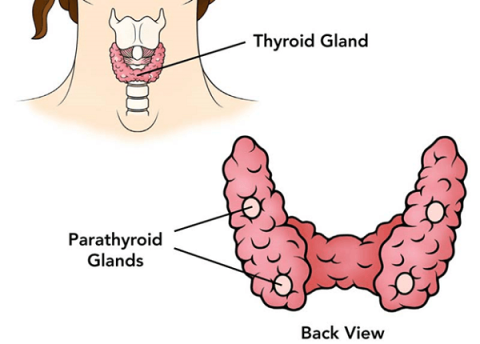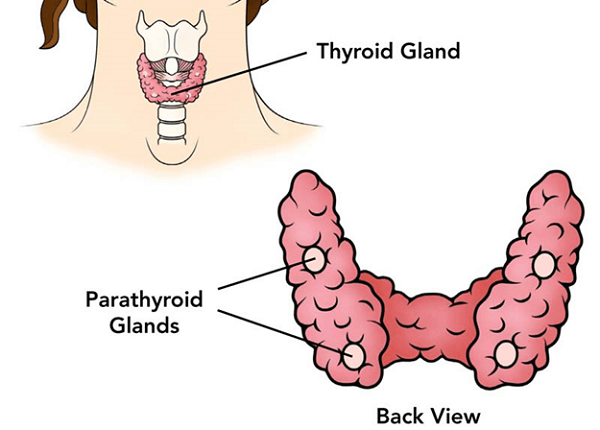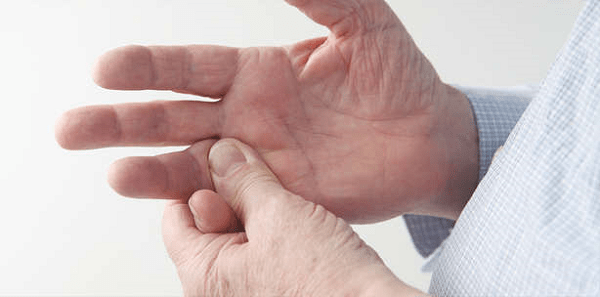Hypoparathyroidism: What You Didnt Know

Currently, the number of cases of congenital hypoparathyroidism has decreased significantly in Vietnam. However, you should still be aware of the symptoms that may appear in your child. In particular, pregnant mothers should monitor their babies during pregnancy. Early detection and treatment of congenital hypoparathyroidism will help children grow and develop normally.
content
- 1. What is hypoparathyroidism?
- 2. Symptoms
- 3. Cause
- 4. Diagnosis
- 5. Treatment
- 6. What should I eat if I have hypoparathyroidism?
1. What is hypoparathyroidism?
This is a rare condition. The parathyroid glands do not produce enough hormones. Or in sufficient quantity but lacking in biologically active function. The parathyroid glands secrete hormones into the bloodstream and travel to different areas of the body. These hormones regulate metabolic processes that affect the function of various organs and activities in the body.

Thyroid gland: thyroid gland. Parathyroid gland: parathyroid gland
Hormones are involved in many important activities. Including regulation of heart rate, body temperature and blood pressure as well as cell growth and metabolism. Parathyroid hormone (along with vitamin D and the hormone calcitonin , produced by the thyroid gland) plays a role in regulating blood calcium and phosphorus levels. This helps to determine bone growth.
This disease affects men and women in similar numbers. The prevalence of the disease in the general population is unknown. Hypoparathyroidism can affect individuals of any age.
2. Symptoms
Due to a deficiency of parathyroid hormone, people may develop symptoms related to abnormally low levels of calcium in the blood ( hypocalcemia ) and increased levels of phosphorus in the blood (hyperphosphatemia).
Muscle spasticity
The severity of this condition can range from mild symptoms such as tingling or numbness in the fingers, toes, or around the mouth (paresthesia) to severe muscle cramps and spasms. Muscle symptoms are often referred to as spasticity. A condition characterized by uncontrollable twitching and spasticity of certain muscles in the arms, legs, or face. In rare cases, convulsions or fainting may occur. Or the level of consciousness may be impaired.

Muscle spasticity is one of the symptoms of the disease
Symptoms of skin and teeth
Affected people may also have dry, rough skin, brittle nails , and excessive hair loss. Some individuals with hypoparathyroidism, especially from an early age, may have abnormalities affecting the teeth. These include underdevelopment of the outer enamel layer, root deformities and an increased risk of tooth decay. Hoarseness or voice changes, wheezing, and shortness of breath may also be associated with chronic hypoparathyroidism.
Psychological disorder
Other symptoms that may be associated with hypoparathyroidism include fatigue, generalized weakness, anxiety or stress, and headaches. Depression, irritability, confusion, disorientation, mood swings, and memory loss have also been observed in people with this condition. In children, hypoparathyroidism can lead to mental and physical retardation if not treated promptly.

Psychological disorders are also a sign of disease
More rarely, other serious complications can occur. These are cataracts, seizures or convulsions, fainting, irregular heartbeat. Some may have calcium deposits (calcifications) in the brain or kidneys. If calcification occurs in the kidneys, kidney function may be impaired. That's why people with hypoparathyroidism may be more susceptible to kidney stones.
3. Cause
Surgery
Hypoparathyroidism can result from removal or damage to the parathyroid glands or their blood supply. This is the most common cause.
Damage following parathyroidectomy in hyperparathyroidism (a condition in which overproduction of parathyroid hormone) can result in the removal of too much parathyroid tissue. Thus, leading to hypoparathyroidism.
Surgery to treat thyroid cancer or goiter can also cause this problem. Usually due to the removal of blood vessels supplying the parathyroid or parathyroid glands during surgery. In these cases, hypoparathyroidism may be temporary. Depends on how much damage is done. Postoperative hypoparathyroidism can occur immediately after surgery or develop months to years later.
Cancer
Although very rare, cancer from another organ can spread to the parathyroid gland tissue. Thereby changing their function. Extensive radiation therapy to the neck during cancer treatment can also affect the parathyroid glands.
Free
Hypoparathyroidism can also be caused by an immune disorder. It is understandable that when the body's natural defense system (antibodies) against invading viruses suddenly begins to attack perfectly healthy cells for unknown reasons. The body's immune system mistakenly attacks parathyroid tissue. Leads to inability to secrete parathyroid hormone.
Natural
Congenital hypoparathyroidism is a condition in which babies are born without parathyroid tissue or have abnormally functioning parathyroid glands. Congenital hypoparathyroidism that occurs during the first few months of life can be temporary or permanent. In some patients, the cause of hypoparathyroidism is not clearly found.
Congenital hypoparathyroidism can also occur in infants born to mothers with hyperparathyroidism. In pregnant women, excess calcium can cross the placenta to the developing baby and inhibit the baby's production of parathyroid hormone.
This can lead to abnormally low blood calcium levels after birth. However, this is only a temporary situation. The baby will gradually recover and start producing parathyroid hormone. Transient hypoparathyroidism can also occur in premature infants born to mothers with diabetes.
Genetic
Hypoparathyroidism can also develop as part of an inherited syndrome such as DiGeorge syndrome, Barakat syndrome…Kearns-Sayre syndrome or MELAS syndrome. In some patients, hypoparathyroidism is associated with Wilson's disease. This is a disease caused by the accumulation of copper minerals in the parathyroid glands. Or hemochromatosis – a condition in which iron builds up in the parathyroid glands. For more information on these disorders, you can refer to: " Wilson's Disease: A Genetic Disease That Can't Be Ignored ".
Magnesium deficiency
Another common cause of hypoparathyroidism is low blood magnesium levels. This is often called functional hypoparathyroidism. Because it will go away on its own once the magnesium level is restored. Magnesium is a very important mineral for the parathyroid glands. When magnesium levels are low, it often leads to low blood calcium levels. Without enough magnesium, the parathyroid glands will not function properly.
In addition to a diet low in foods high in magnesium, a common cause of low magnesium levels is alcoholism . In people with malnutrition, malabsorption, diabetes, chronic diarrhea, kidney disease, and taking certain medications, there is also less magnesium in the blood.
4. Diagnosis
Diagnosis of hypoparathyroidism is made based on the identification of characteristic symptoms and previous medical history. Besides, it is necessary to have a doctor's examination to evaluate the general condition and many specialized tests. Blood tests can show abnormal levels of calcium, phosphorus, magnesium, and parathyroid hormone. A urine sample will help reflect whether the body is excreting too much calcium.
Additional tests may be done to detect possible complications related to hypoparathyroidism. For example, an electrocardiogram may show an arrhythmia. It is sometimes associated with low calcium levels in this condition.
Genetic testing in some cases will help detect specific gene mutations that cause the syndromes associated with hypoparathyroidism.
5. Treatment
Treatment depends on:
- Symptoms are specific to each individual.
- Test results.
- Age and general health of the patient.
You should see a doctor who specializes in the diagnosis and treatment of disorders affecting the endocrine organs (endocrinologist). Then, besides treatment, it can screen for disease in the family.
The main treatments for people with hypoparathyroidism are calcium supplements and activated vitamin D.
Some people with hypoparathyroidism may be encouraged to make dietary changes to help treat their condition. Affected individuals may be encouraged to eat calcium-rich foods. including dairy products, cereals, orange juice and green leafy vegetables. Furthermore, you may be encouraged to avoid foods high in phosphorus such as sodas, eggs, and meat. The goal is to keep blood phosphorus levels as low as possible.
6. What should I eat if I have hypoparathyroidism?

Foods that you should eat when you have hypothyroidism
If you have hypoparathyroidism, your diet should be rich in calcium and low in phosphorus. Drinking 6 to 8 cups of water a day can also help ensure that your body doesn't lose the nutrients it needs. Foods rich in calcium include:
- Dark green beans and vegetables
- Dairy products, cereals, oats
- Dried plums, apricots, oranges
You can find more information about calcium-rich diets in the article: " 8 things about calcium that you should know ".
Certain foods rich in phosphorus can significantly reduce calcium intake. Therefore, you should avoid the following foods:
- Soft drink
- Eggs, red meat (beef, pork, lamb ...)
- Processed foods like bread and instant noodles
- Harmful fats, which can be found in baked goods
- Coffee, alcohol, tobacco
Discuss dietary changes with your doctor to make sure you're getting the vitamins and nutrients you need. Although hypoparathyroidism is getting less and less, you still need to pay attention to the important signs for timely treatment.